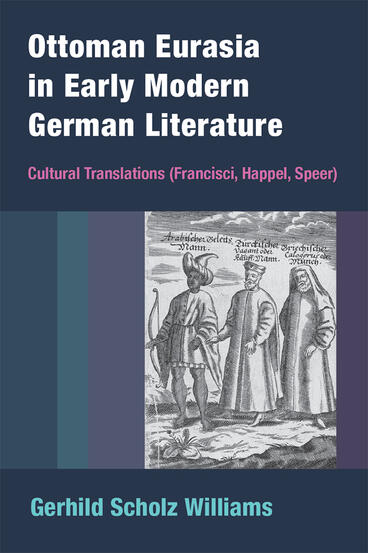Ottoman Eurasia in Early Modern German Literature
Cultural Translations (Francisci, Happel, Speer)
Europe and the Ottoman Empire through three 17th-century writers
Description
Even a casual perusal of seventeenth-century European print production makes clear that the Turk was on everyone’s mind. Europe’s confrontation of and interaction with the Ottoman Empire in the face of what appeared to be a relentless Ottoman expansion spurred news delivery and literary production in multiple genres, from novels and sermons to calendars and artistic representations. The trans-European conversation stimulated by these media, most importantly the regularly delivered news reports, not only kept the public informed but provided the basis for literary conversations among many seventeenth-century writers, three of whom form the center of this inquiry: Daniel Speer (1636-1707), Eberhard Werner Happel (1647-1690), and Erasmus Francisci (1626-1694). The expansion of the Ottoman Empire during the sixteenth and seventeenth centuries offers the opportunity to view these writers' texts in the context of Europe and from a more narrowly defined Ottoman Eurasian perspective.
Ottoman Eurasia in Early Modern German Literature: Cultural Translations (Francisci, Happel, Speer) explores the variety of cultural and commercial conversations between Europe and Ottoman Eurasia as they negotiated their competing economic and hegemonic interests. Brought about by travel, trade, diplomacy, and wars, these conversations were, by definition, “cross-cultural” and diverse. They eroded the antagonism of “us and them,” the notion of the European center and the Ottoman periphery that has historically shaped the view of European-Ottoman interactions.
Gerhild Scholz Williams is Barbara Thomas and David M. Thomas Professor in the Humanities, Vice Provost, Associate Vice Chancellor at Washington University in St. Louis. She is a Sixteenth Century Society & Conference Medalist.
Reviews
“Williams is a proven expert on early modern German literary history, and comparative literature. She playfully overcomes established disciplinary boundaries by integrating approaches from literature, history, culture, and media studies to reflect the ever-changing early modern images of ‘Ottoman’ Eurasia in the contemporary German media perception. This multifaceted and versatile book will be read in undergraduate courses to get acquainted with the popular German literature of the 17th century, and in graduate courses as a guide to further explorations of the vast textual production, their context and references.”
- Flemming Schock
—Flemming Schock, University of Würzburg
“Ottoman Eurasia in Early Modern German Literature not only expands research on the image of Turks in 17th-century literature but also makes literary texts fruitful for historical questions. In addition, it sheds new light on three authors who have so far been little noticed by literary scholars.”
- Victoria Gutche
—Victoria Gutsche, Friedrich-Alexander University
"Ottoman Eurasia in Early Modern German Literature. Cultural Translations (Francisci, Happel, Speer) is a compelling read that would make an excellent addition to any reading list for advanced undergraduate or postgraduate students eager to broaden their understanding of early modern cross-cultural relations."
- Talitha Maria G. Schepers
—Journal of Early Modern History
". . . the close reading of ample textual evidence presented here compellingly documents a qualitative shift toward a more differentiated and benevolent representation of turks and of the Ottoman empire in Germany."
- Peter Hess
—The German Quarterly

